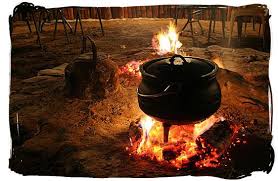 I swiped the title to this post straight off the Slate article but it was just too good to pass up...short, to the point and in only five words, a perfect and literal summation of an entire book.
I swiped the title to this post straight off the Slate article but it was just too good to pass up...short, to the point and in only five words, a perfect and literal summation of an entire book.Despite swimming upstream against to the entire field of anthropology, Richard Wrangham, author of Catching Fire: How Cooking Made Us Human, proposes a theory of evolution that is one part wacky, one part fascinating, and all cooked over a warm fire.
My wife will get a big kick out of this.
From Slate...
Historians of the deep human past generally consider cooking to be a recent activity. A significant number of hearths have been unearthed around the 76,000 year mark, and there is diminishing archeological evidence of controlled fire the further back you go. The assumption is that once we became modern, we worked out how to cook.
Wrangham, by contrast, thinks we were cooking 1.8 million years ago—and that the activity was not an outcome of being human but that being human was an outcome of cooking. Cooking physically transformed a creature that was more ape into the earliest version of us, Homo erectus.
[T]he more cooked food we ate, the less industrial-strength digestion we had to do, and the smaller our guts became. In the same way that our bodies evolved to better walk on two legs, our bellies changed to better handle well-done over rare. This had two enormous payoffs. First, as our guts got smaller, this freed up energy for our brains to operate on a larger and larger scale. (Leslie Aiello and Peter Wheeler first discovered the relationship between gut size and brain size, dubbing it the Expensive Tissue Hypothesis.) Second, as we spent less time eating, we had more time to do other things with those rapidly expanding brains.
Update: Kojo Nnamdi had the author of "Catching Fire" on his radio show yesterday. Click here to listen.
No comments:
Post a Comment